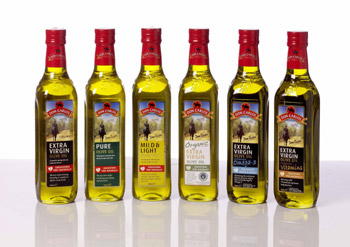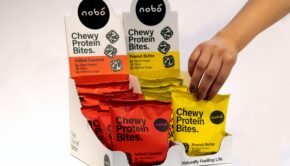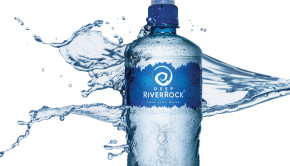Pressing olives

When it comes to holding out the proffered olive branch, the olive oils sector has not just made its peace with the Irish market, but made a veritable impact.
10 February 2009
At a glance: olive oils
- Don Carlos has introduced three new health focused Extra Virgin Olive Oils to its range, including varieties enriched with Omega 3 and vitamins
- Italian brand Monini started production in 1920, and currently produces almost 30 million litres of olive oil per year
- Family-run business Casa Pons produces Romulo Olive Oil, which is obtained exclusively from Arbequina and Cornicobra varieties, native to the North of Spain
- Spanish food group SOS Cuetara purchased Italian olive oil company Bertolli from Unilever in July for €630m
Since 2005, market analyst Mintel has found that “the shift away from standard oils to premium olive and speciality oils has gathered pace.” The growth of olive oil from a speciality product towards more mass market status, was largely due to the promotion of olive oil’s health benefits and investment in product range. Mintel stated in 2005 that, “light and mild oils are expanding while spray oils are also benefiting from growth. However it is the specialty sector, which includes flavoured and infused oils, that has made most progress.” With the obesity problem worsening in Ireland, to the extent that some 24% of the population are now classified as obese, a healthier Mediterranean lifestyle, using products such as extra-virgin olive oil in cooking is increasingly appealing.
Olive oil is traditionally a high value performer moreover. In 2003, the researcher reported that, “while standard cooking oils continue to be the most widely used type of liquid oil, olive oil has superseded the value sales of standard oil, despite it only having 16% volume share of the liquid market.” And although the devaluing power of own-label has since placed pressure on the margins of premium oils; such oils can still command a relatively high price.
Oils become even healthier
The range of Don Carlos Olive Oils has just been extended to include three new health focused varieties of olive oil.
Don Carlos Extra Virgin Olive Oil Enriched With Omega 3, is designed for consumers who want to ensure healthy hearts and bodies. Omega 3 oils are the good (polyunsaturated) fats and are well recognised by the medical profession as playing an important role in brain function and in maintaining heart health. Using Don Carlos Extra Virgin Olive Oil enriched with Omega 3 in your diet is an effective way of increasing Omega 3 intake for the whole family, as one 15 ml serving (one tablespoon) provides 18% of the recommended daily intake of Omega 3.
Don Carlos Organic Extra Virgin Olive Oil is a rich, fruity olive oil and is grown organically for the best flavour. The oil is produced from olives grown in Andalucia under strict environmental conditions, free from any chemical agent.
Don Carlos Extra Virgin Olive Oil Enriched With Vitamins, provides all the traditional benefits of olive oil with added vitamins A, D, E and K. All of these vitamins are required for carrying out vital functions within the body and are involved in the utilisation of major nutrients including carbohydrates, fats and proteins. Vitamin A is essential for vision and healthy skin, while Vitamin D is needed for healthy bones and teeth. Vitamin E is an antioxidant, vital for skin health, while Vitamin K facilitates the proper functioning of the blood in the body.
For more product information and recipe ideas visit www.doncarlos.ie
Authentically Italian family tradition
Monini, the authentic Italian olive oil brand, started production in 1920, focusing on extra virgin olive oil. Today the company produces almost 30 million litres of olive oil per year. Following family tradition, Zefferino Monini still personally tastes each oil and selects only the best to ensure consistent quality. This dedication and attention to detail has ensured that Monini has retained its first class rating both in Italy and worldwide.
Over the years the Monini range of oils in Ireland has grown substantially, and now includes Olive Oil, “GranFruttato” Extra Virgin olive oil, “Classico” Extra Virgin, Grapeseed oil, the seasonal “Il Monello” Extra Virgin olive oil, and Balsamic Vinegar, catering for consumers’ every possible requirement.
This year, Monini will continue to bring premium quality oils to Irish consumers, supporting them with a variety of promotions, extra fills, and banded packs over the summer period.
Monini oils are available in all major retailers and are distributed by BR Marketing. For further information please call 01 8850800, fax 01 8850899 or email info@brmark.ie
Hand picked and carefully pressed
Casa Pons is a family-run business that produces Romulo Olive Oil. It is obtained exclusively from Arbequina and Cornicobra varieties, which are native to the North of Spain. Both olive varieties produce a noble, full-bodied, sweet and pleasantly fruity oil. The different stages that an Olive tree goes through result in the optimum quality of fruit and final product. Great care and attention is taken in the olive grove, from pruning in the spring to flowering and growing the fruit. The olives are hand picked at the end of autumn and carefully pressed. Febvre & company offers a variety of products from Romulo including Extra Virgin and Pure Olive Oils and flavoured oils in a range of sizes up to five litres.
Romulo Olive Oils are distributed by Febvre & Co. For further details please phone 01 2161400 or email: info@febvre.ie
Olive oil retail grades
The International Olive Oil Council (IOOC) is the intergovernmental organisation in charge of administering the International Olive Oil Agreement. The last agreement adopted in 2005, places a greater emphasis on protecting the environment in olive growing and the olive products industry, as well as on achieving quality in olive oil and table olives and making known their attributes. As part of the European Community, Ireland is a member of the IOOC, and therefore must adhere to its labelling standards, with labels in stores showing an olive oil’s grade.
- Extra-virgin olive oil comes from cold pressing of the olives, contains no more than 0.8% acidity, and is judged to have a superior taste. Extra-virgin and virgin olive oil may not contain refined oil.
Virgin olive oil has an acidity less than 2%, and is judged to have a good taste.
Pure olive oil. Oils labelled as Pure olive oil or olive oil are usually a blend of refined and virgin or extra-virgin oil.
Olive oil is a blend of virgin oil and refined oil, of no more than 1.5% acidity. It commonly lacks a strong flavour.
Olive-pomace oil is a blend of refined pomace olive oil and possibly some virgin oil. It is fit for consumption, but may not be described simply as olive oil. Olive-pomace oil is rarely sold at retail; it is often used for certain kinds of cooking in restaurants.
Lampante oil is olive oil not suitable as food; lampante comes from olive oil’s long-standing use in oil-burning lamps. Lampante oil is mostly used in the industrial market.
Med diet may help manage metabolic syndrome: Study
Eating a Mediterranean-style diet may help manage some of the metabolic abnormalities in older adults at high risk for heart disease, says a new study.
The prevalence of metabolic syndrome was reduced by 13.7% when the diet was supplemented with nuts, by 6.7% when supplemented with olive oil, and by only 2% in the control group, according to findings published in the Archives of Internal Medicine.
The Med diet, does not only use olive oils generously but is rich in cereals, wine, fruits, nuts, legumes and whole grains, fish and olive oil, and low in dairy, meat, junk food and fat. It has been linked to many health benefits including longer life, less heart disease, and protection against some cancers. The diet’s main nutritional components include beta-carotene, vitamin C, tocopherols, polyphenols, and essential minerals.
“Traditionally, dietary patterns recommended for health have been low-fat, high-carbohydrate diets, which generally are not palatable,” wrote the authors, led by Jordi Salas-Salvado from the University of Rovira i Virgili, Spain.
“The results of the present study show that a non–energy-restricted traditional Mediterranean diet enriched with nuts, which is high in fat, high in unsaturated fat and palatable, is a useful tool in managing the metabolic syndrome.”
Metabolic syndrome (MetS) is a condition characterised by central obesity, hypertension, and disturbed glucose and insulin metabolism. The syndrome has been linked to increased risks of both type two diabetes and CVD.
“Development of the metabolic syndrome depends on a complex interaction between still largely unknown genetic determinants and environmental factors, including dietary patterns,” explained the authors.
New Bertolli owner sells biscuit division
In order to help finance its €630m purchase of Italian olive oil company Bertolli from Unilever in July, the Spanish food group SOS Cuetara has sold its biscuit division to Grupo Nutrexpa in a deal valued at €215m.
The company had been looking for a buyer for its biscuit business since September, partly to finance its purchase of Bertolli. It was reported that two other Spanish food groups, DeLaViuda and Panrico, had also shown an interest, as had the UK’s United Biscuits. The division originally carried a target price of €300m.



 Print
Print






Fans 0
Followers